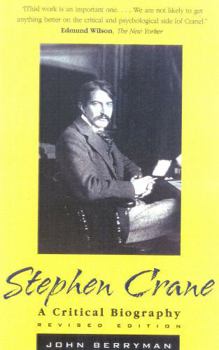Stephen Crane: A Critical Biography
Select Format
Select Condition 
Book Overview
A penetrating study of the life and writings of Stephen Crane, author of The Red Badge of Courage , by one of America's greatest poets and critics.
Format:Paperback
Language:English
ISBN:0815411154
ISBN13:9780815411154
Release Date:May 2001
Publisher:Cooper Square Press
Length:368 Pages
Weight:1.00 lbs.
Dimensions:1.0" x 5.5" x 8.4"
Customer Reviews
2 ratings
The sun was pasted in the sky like a wafer
Published by Thriftbooks.com User , 17 years ago
John Berryman ( Dreamsongs) was one of America's finest poets. He began as a literary critic and this thorough work on the life of Crane contains both a solid biography and considerable literary criticism of Crane's work. He writes of Crane as a young , rebelious genius, who had his own way of seeing things. He traces in detail the journalistic career of Crane which led him not simply to the Bowery and East Side, but to battlefieds in Greece and Cuba. He analyzes to a degree Crane's masterpiece ' The Red Badge of Courage' Here is his brief description of the work. "The Red Badge of Courage is the story of the mind of a new young Northern soldier as it accustoms itself to war during two days in and out of his first battle. There is a preliminary debate within himself as to whether he will run away or not. When his regiment is charged a second time, hye does, and hides resentfully in a wood, where he meeta a rotting corpse in a chapellike place. He joins the march of wounded away from the battle and comes on a friend hurt horribly, a tall soldier, whom he accompanies to his extraordinary death.A tattered man has befriended him on the march, this man, whose plight is very bad, his mind wandering, the youth deserts in shame, on the question reiterated, of where he is wounded. Then in a flight of the troops he is clubbed with a rifle when he tries to ask a panic- stricken man a question. An unseen man finally helps him back to his regiment.Since it has got scattered during the battle his shame is unknown: he says he was shot and is cared for by a friend, a loud youth who bandages his bloody head.He sleeps. Next morning he feels no remorsek and is full of "self-pride" even, when the loud youth reluctantly and shamefacedly has to ask for the return of a packet of papers given the youth in fear, before the battle."He had been possessed of much fear of his friend, for he saw how easily questionings could make holes in his feelings." Now "his heart grew more strong and stut.He had never been compelled to blush in such a manner for his acts' he was an individual of extraordinary virtues." In the battle of this second day he is a war devil.During the charge, when the color- bearer is killed, he wrenches the flag free and bears it. In hard new fighting he and the loud youth are commended. The regiment takes a fence and a flag, and rests. "He had been to touch the great death and found, that after all, it was but the great death . He was a a man ...Scars faded as flowers" One of the great praises of 'The Red Badge of Courage' is how Crane who had never experienced war, managed to write of it more realistically than so many who it had. This ' ironic realism' of Crane, this daring way of seeing and imagining reality were distinctive of his genius. This is a very good book. And it also contains Berryman's critical readings of Crane's quite strange and wholly unique poetry.
Milestone in Crane Studies
Published by Thriftbooks.com User , 17 years ago
Now going on 60 years old, this was poet Berryman's doctoral thesis. It remains a milestone study on Crane, and in American literature studies generally for its acute insights. It stands up quite well to most Crane studies since; though more "facts" have emerged, they do not greatly alter the essential portrait. A good complement to Berryman's book is Robert Stallman's, which sets Crane in the context of his fantastic end-of-a-century day. But to get at the core of the creative genius it really takes another, and while some of Berryman's views are still controversial, there can be little arguing with most of it. Crane wrote two short novel masterpieces, Maggie and the Red Badge, and several of the best stories in modern English to date in a short span of about 8 years. Berryman deftly mixes biography with literary criticism of these works in a sound scholarly way unfortunately no longer fashionable. His bow to the ethos of his own times is a Freudian chapter at the end, which you can take or mostly leave. Its placement is simultaneously shrewd and cynical; an obvious bow to Berryman's teachers' demands, but to any other reader as detatchable as a coupon. It therefore does not mar the otherwise deep meditation on this mercurial personality, who Berryman characterizes as a "volcanic" natural talent from whom words flowed like lava. Berryman believes Crane was likely to have dwarfed most other American novelists had he lived and produced beyond his mere 30 years. While such speculations are often a distraction, his affinity with Crane turns them into a compelling meditation on where American literature was shortly to go: to World War I and Paris. Berryman, even without his subsequent poetic output, was an important critic, and this book also serves as the proper starting point to his own double career. Work on Crane still needed to be defended when Berryman wrote in 1950 -- he has lasted 50 years since his writing, Berryman pronounces, setting a yardstick and defense. Now, ironically, his own fine book has met the same test of time.




